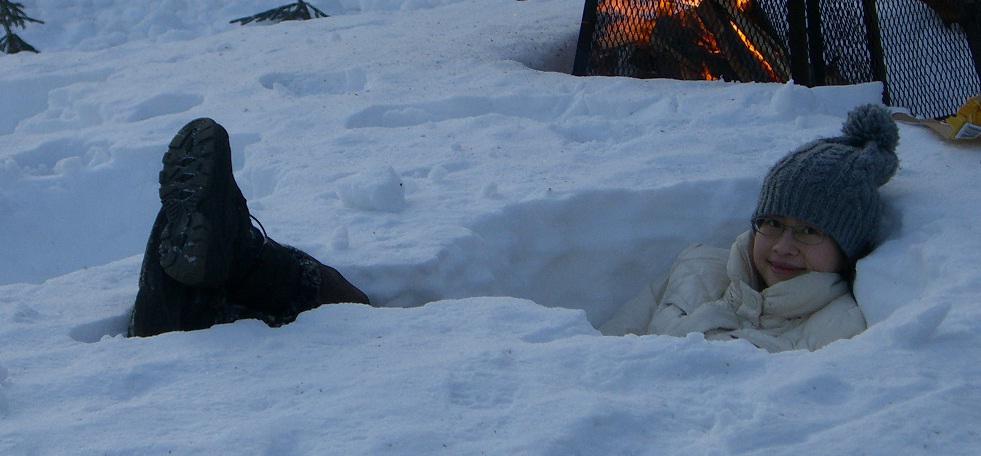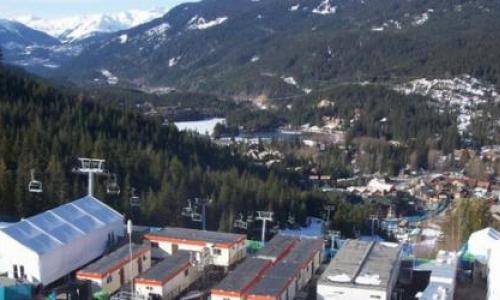
Walking to my final exam in December last year, I distinctively remembered my phone vibrating with an incoming call. It was a call that would throw out my carefully constructed academic plans for the upcoming semester. The call was for a Human Resources co-op offer in Labrador City, Newfoundland, a job that I recalled applying and interviewing for, but was lately consumed by thoughts of finals.
Having lived in Vancouver all my life, the idea of living in a place that reached -30ºC and -40ºC or colder in the wintertime was daunting. I was unsure how I would adjust to living on the east coast with a town that has a population of 8,000. It would also be my first time living away from home. I had to remind myself that I wanted to expand my horizons and complete a co-op term out of province. Here was my chance.
On New Year's Day, I boarded the plane and there began many first time experiences. I stopped over in Montreal overnight and got on a turbo airplane the next day for the first time. Looking out the window as we touched down in Lab City, the first two words that came into my mind were "winter wonderland." Untouched snow blanketed the entire town. Its beauty and stillness was breathtaking.
When I stepped inside the airport, I was overcome with amazement that its size was similar to just one waiting room in Vancouver. As I was given a tour of the town, it was then that I realized it only took fifteen minutes to walk around Lab City; there was also only one other neighbouring town with 2,000 people. Since I am directionally challenged, it was a relief to know that I could not get lost here.
I soon began to take in the small town charms. The daily police and ambulance sirens that I was used to hearing back in Vancouver were replaced with quietness. It was refreshing to see the crime rate practically non-existent. There were no security guards at the bank. What took me by surprise was when I requested for a withdrawal from the teller. The teller simply opened a drawer in front of her and counted the bills prior to handing it over to me. It was unusual for me because I was used to seeing cash kept in a vault, which required passwords and keys for access.
It seems that wherever I went in Lab City, people nodded and smiled at me. Complete strangers would stop to ask how I am doing. I would walk into a grocery store or a restaurant and recognize people from work. On warmer days, I could walk to wherever I wanted to go. Snowmobiles were as common as bicycles in Vancouver. The ease that people got around in the snow in Lab City was surprising. There was also only one set of traffic lights in the entire town and it was in front of my workplace, Iron Ore Company of Canada.
IOC is involved in the steel making industry and the impact that this company has is far reaching. It is the largest manufacturer of iron ore pellets in Canada and its product is delivered across North America, Europe and Asia. The cars we drive and anything else that we own or use that involves steel, needs iron ore. IOC's headquarter is in Montreal, but its mining operations is in Lab City and Sept-Iles, Quebec. This company employs approximately 1,700 people in Lab City with a combined workforce of over 2,200 employees across all three cities. Notably, one of the previous Canadian Prime Ministers, Brian Mulroney, was the past president of IOC.
At IOC, there are various buildings scattered throughout its worksite, with internal shuttles used to transport workers to different buildings. The amount of time it takes to drive around the town is less than driving from one end of the worksite to the other! Almost everyone in Lab City is connected to IOC in some way. Everyone here knows someone that works in this company.
Working in Human Resources
Safety is IOC's number one priority; thus, the first week for any new employees, including co-ops, is spent in orientation. During the second week, I was introduced to my department and started settling down.
I was put in charge of recruitment for the Summer Student Employment Program (SSEP). SSEP employs students formining and processing operational roles to assist with day-to-day tasks. As I am a student majoring in Human Resources with an interest in recruitment, this job provided a great hands-onopportunity to develop my future career path.
I scanned hundreds of resumes and saw firsthand that resumes with simple but effective formatting and result driven descriptions of previous experiences stood out from other applications. Furthermore, I was given the opportunity to conduct interviews. This was one of the highlights of my job as I gained insight on typical answers applicants give. I realized that for applicants to stand out, they must demonstrate enthusiasm and provide relevant, engaging and unique experiences.
When I started making contacts with potential candidates, I learned that as much as I would like to follow up with all eager applicants and respond to all of their inquiries, it was not possible given the number of candidates. Even though I understood students' anxiousness to receive an offer, an offer cannot be made to everyone.
Throughout this work term, I gained independence and foresight in predicting issues that would arise and implemented mitigation measures. I developed the ability to collect, organize and present relevant data to my supervisor. My academic learning regarding turnovers, employees' contracts, performance appraisals, and much more, came alive during the monthly department meetings. I realized how crucial it was to celebrate successes and acknowledge areas that needed improvement, this enabled employees to have a general understanding of their department and company performance.
Life in Lab City
IOC employs over a dozen of co-ops per semester and as this company is part of the mining industry, most of the co-ops are engineers. As a business student, this gave me exposure to students outside of my faculty. Since most of the co-ops were not from Lab City, it was prearranged that we would live in the same apartment building throughout our work term. Everyone quickly bonded with one another and together we ventured into trying moose meat, seal meat, skiing, curling, snowmobiling, star gazing and much more.
I also experienced the warmth and hospitality of people from this community. I was invited to several families' homes for meals, board games and movie nights. Potlucks and homemade dessert nights were also common. Just an inside tip: People in Lab City are great at making desserts!
Final Thoughts
I adapted to the culture and environment much quicker than I thought I would. I encourage everyone to take the time during their university years to live in a completely new environment by going on exchange, traveling out of province for co-op, etc. Living on your own and experiencing a different culture can enrich your understanding about yourself and the people around you. It is during your time in university that you have the flexibility and the time to do so. Break through your comfort zone and when you come back to Vancouver, you will have endless stories to tell!














